Natasha is a libretto written in fifteen stand-alone sections exploring aspects of slavery, the sex trade and trafficking.
Shelter is the first section of Natasha to have a commissioned score for performance and was funded by the Arts Council of Wales in 2015.
Shelter explores forced marriage and Stockholm Syndrome where a young girl is married to an old husband; the impact of memory over time and the (im)possibility of freedom.
Shelter has been developed in collaboration with composer Ashley John Long; three professional vocal performers from The Royal Welsh College of Music and Drama: Lara-Clare Bourdeaux, Laura Curry, and Tom Smith: Ashley on double-bass, Jimmy Ottley on violoncello, and electronic elements.
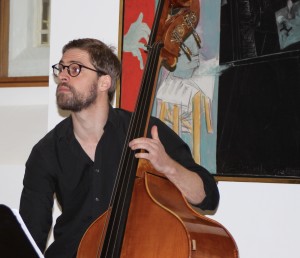
Peter Reynolds, Composer (1958-2016)
Shelter (Natasha) is a chamber opera lasting around forty-five minutes, dealing with the issues surrounding the abuse of a young underage girl. The libretto is by Jane Fox and the music by Ashley John Long; it was heard in a concert performance at The Royal Welsh College of Music and Drama on September 11th 2015.
The issues involved are harrowing and disturbing, but the work’s power often emanates from the quiet understatement and dignity with which its issues are presented in Jane Fox’s libretto. This is supported by Ashley John Long’s music which provides a strong ritualistic sense of dramatic shape for the horrific events that unfold.
The work is particularly impressive for the way in which opera is transformed into a new and intimate medium using three singers and a handful of instrumentalists including cello and the composer himself playing the double bass.
The music is not structured around the traditional devices of aria, recitative and ensemble but unfolds in large blocks of sound, including meditative passages based on Renaissance music. The result is akin to an intimate confessional in which events, emotions and conversations are recalled, sometimes with great violence, but also allowing the music to meditate and reflect on what has been heard. The result is impressive and very moving.
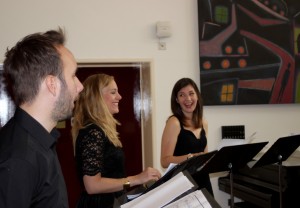
Jana Holesworth The Royal Welsh College of Music and Drama and Opera’r Ddraig, Cardiff
Shelter (Natasha) is a wonderful composition that merits being seen and heard. It broaches a very important, albeit difficult topic with sensitivity and intelligence.
It is a piece unlike any I’ve seen in recent years and is truly something special, which deserves further development.
True to the nature of human thought processes, the story doesn’t progress in typical linear fashion but rather jumps about, as thoughts and memories do. Furthermore, rather than adhering to the standards of operatic performance, Natasha is performed with little staging. The combination of these unique approaches to composition and directing allow the audience to feel rather than observe the challenges faced by the primary character.
I felt overwhelmingly moved watching Shelter and I hope that this stunning and significant piece of work is given the support necessary to expand and grow.
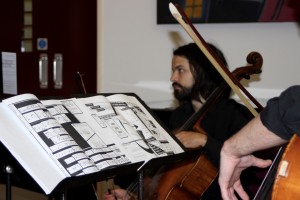
Ian (Alexander) Grant Actor and Producer, London
The Arts Council’s goals for the use of taxpayers’ money are excellence, innovation, diversity and reach. Shelter clearly fulfils the first two of these goals, and the support of The Welsh Arts Council for the research and development of this serious and compelling piece of work is amply justified. The material, which conveys the sensations of anxiety, oppression and fearful hope of a young woman and an older man locked in an abusive polygamous marriage, is both timeless and very current. The work would benefit from further development and production funding to support its delivery to diverse and numerous audiences.
The quality of the innovative creative work of Jane Fox (librettist) and Ashley John Long (composer) is outstanding – honest, fierce, sensitive and finely crafted. The piece combines two sopranos and a tenor voice weaving abstract musical sounds and tones with spoken voice and melodic musical line. The warp to the weft of the voices comes from cello, double bass and pre-recorded music and spoken words. The score is complex, intricate, at times densely textured and percussive with passages of purity of sound echoing Bach.
The audience attending the first performance was completely attentive, silent, absorbing the physical sensations and emotions of fear, terror, yearning, tragic incomprehension, childhood betrayed. The performers had clearly worked intensively in rehearsal to arrive at a relaxed, intuitive understanding of each other’s contribution in the piece so that listening, exchange, combination and opposition created a pulse, a rhythm, climaxes, recovery and ultimately a shapely resolution of the work. They are highly skilled young professional musicians.
Shelter is an exceptional piece of work, complete in itself and also promising a much greater exploration of important, uncomfortable material with social and political value and purpose.
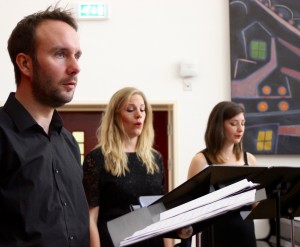
Sally Varrall Senior Lecturer and Programme Director for the BA (Hons) Dance degree, Cardiff Metropolitan University
I feel honoured to have been invited to the Research and Development performance at The Royal Welsh College of Music and Drama. I witnessed a new experience and one that was compelling and absorbing. Thank you.
Feeling privileged to be invited to attend a sharing of an R&D performance in disciplines that are not in my more familiar experience of dance, I became more and more immersed in what became quite a sensory experience. The performance invited you in with its gradual introduction of unfamiliar vocal expressions that were repeated and built rhythmically, and built towards musical statements that shared and developed differing stories.
As an audience member who usually views as a primary way of taking in the experience, this is how I initially received what I was watching; following where the sounds were coming from, shifting my gaze from three vocalists to the two instrumentalists/musicians. The landscape of sound continuously absorbed my attention, although I did wonder, if I had not read the programme notes whether I would have interpreted the score for its intended meaning. This however became far more explicit when a narrative was introduced (spoken and sung). The interplay of sounds and spoken word with the layering of quite exquisite playing of the musical composition was very effective indeed. The filtering of sound and vocalisations at times intensified to an almost chaotic state (achieved particularly by an incredible solo on the double bass) and of itself became an exquisite and detailed physical performance utilising every fibre of the body.
The individual physicality and connection between all performers was another highlight of the performance. All of the ensemble seemed to create their own distinct persona in the telling of their story (vocally and physically). The dynamic interplay and communication between the composer/musician and the vocalists also contributed to generate a connection that was all the more visible because of the intimacy between performers and audience. This intimacy and use of space is something that I hope continues to be considered. I do think the use of space (distance and proximity) between the performers can be further explored, to consider whether an additional layer of narrative can tell another tale through spatial connections/disconnections. Space, silence, emptiness can also speak volumes.
An incredibly absorbing and quite intense experience!
This is very clearly a high quality collaboration working with experienced artists who share a desire to experiment and challenge. This has to be applauded and supported.
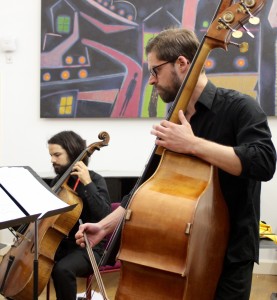
John Atkinson Actor, Cardiff
Shelter was an entirely new experience of opera for me; indeed, an education in what could be achieved by a mere violoncello, double bass and three voices working at different times in juxtaposition, opposition, and harmony as the work unfolded. This was story-telling and intense emotion delivered in an extremely pared-down way which avoided distraction from traditional ‘performance’, drawing the audience into one with the artists.
As an enthusiastic but fairly conservative supporter of theatre and opera, I was astounded by the versatility of the instruments, with the double bass in particular being handled like a heavy metal guitar to produce sounds from raw percussion and screech to unexpectedly high and soft notes. Alongside, the three vocalists moaned, grunted, squealed, soared and fluttered to the heights as the messages of subjugation, hope, relationships between victim and abuser threaded through the piece.
The performance was absolutely captivating; merging adventurous music and singing with a subtle yet important message to create a fully engaging whole. Surely worthy of development into a full-scale work.
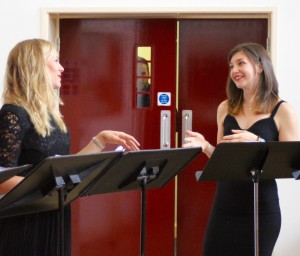
Ps. The The audition was fun, though I did not get the impression that the level of singing required would be so testing and formally trained as I witnessed in performance. The themes of the project were well explained and certainly seduced me into taking the opportunity of seeing how it was developing.
https://youtu.be/_cIm0zezeLI
Asking4It Productions are archived at intervals by The National Library of Wales since 2016.
Copyright Asking4It Productions. All Rights Reserved 2022
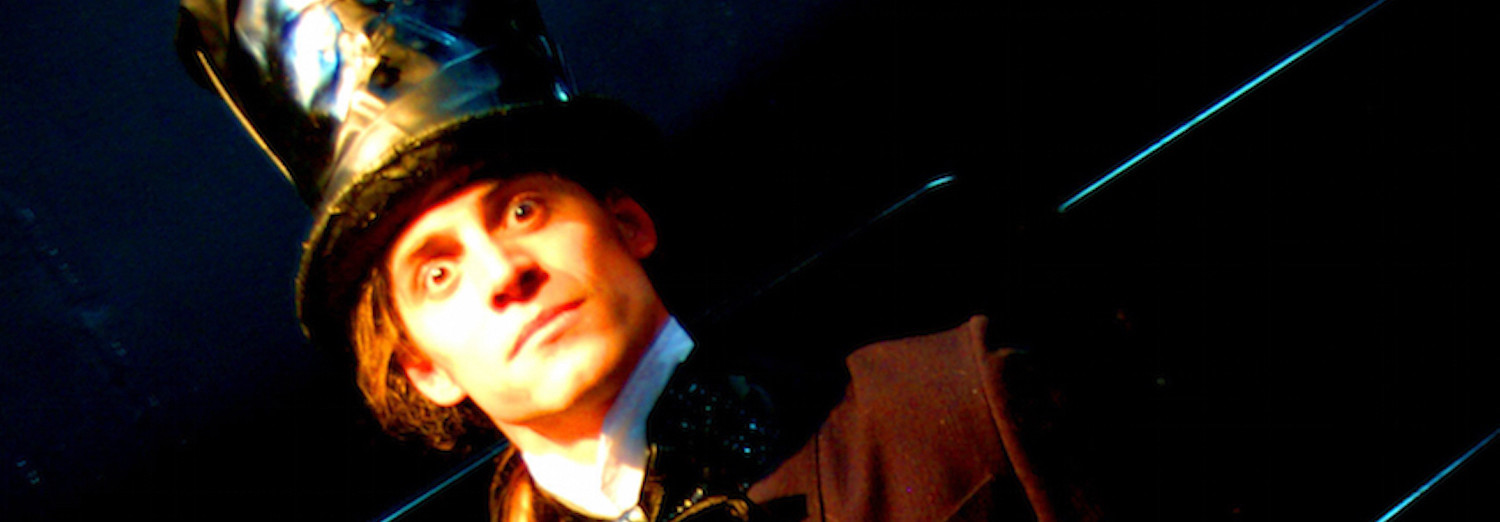

![Lottery_landscape_black[1].jpg (1)](http://asking4itproductions.co.uk/wp-content/uploads/2017/05/Lottery_landscape_black1.jpg-1-300x76.jpg)





